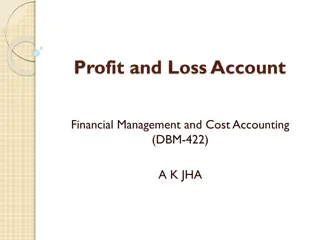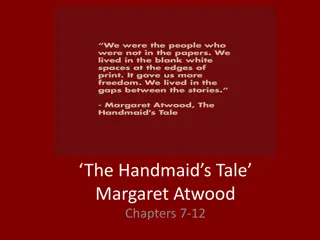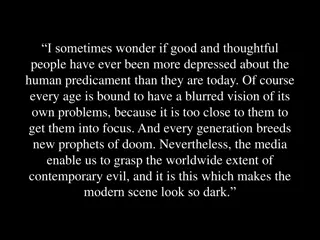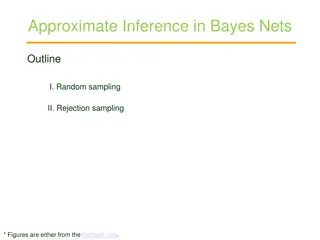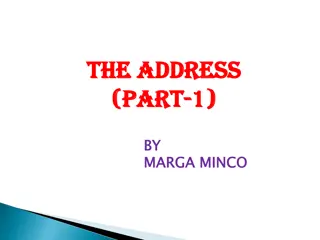Human Predicament: A Moving Tale of Loss and Rejection
A poignant narrative unfolds as a young survivor of World War II attempts to reclaim her belongings from an acquaintance's house. The encounter exposes deep-seated emotions of loss, rejection, and the complexities of post-war existence. Through subtle interactions and realizations, the story delves into the human predicament and the enduring impact of wartime experiences on individuals.
Download Presentation

Please find below an Image/Link to download the presentation.
The content on the website is provided AS IS for your information and personal use only. It may not be sold, licensed, or shared on other websites without obtaining consent from the author.If you encounter any issues during the download, it is possible that the publisher has removed the file from their server.
You are allowed to download the files provided on this website for personal or commercial use, subject to the condition that they are used lawfully. All files are the property of their respective owners.
The content on the website is provided AS IS for your information and personal use only. It may not be sold, licensed, or shared on other websites without obtaining consent from the author.
E N D
Presentation Transcript
Author Marga Minco is the pen name of Sara Menco. In 1942, her parents were forced to move into the city's Jewish Quarter. The parents, her brother and sister were all deported and Marga/Sara managed to survive the war in hiding. Thus, her stories often revolve around the existential problems often faced by survivors.
Introduction The story is about the human predicament that follows the pre-War and Post-War period. Mrs. S who was a Jews, a rich lady. Whereas, Mrs. Dorling was a non-Jews. The girl, daughter of Mrs. S, had lost her house and her mother during the war and she had decided to come back to take her possessions from Mrs. Dorling, an acquaintance whose address was given by her mother years ago. When she reached the house, the woman treated her with a cold reception and didn t let her into the house. She decided to make a second visti and then she met her daughter who let her in and told her to wait inside. When the narrator saw all the possessions in front of her, she couldn t connect with them and decided to leave the house.
Vocabulary Chink narrow opening Fleetingly for a short time Musty stale Enamel an opaque or semi-transparent substance that is a type of glass Jamb side post of a window, fireplace or doorway Acquaintance stranger or social contact Lugging carry a heavy object with great effort Pityingly feeling sorrow Crick cramp or spasm in muscles Reprovingly critically Beckoned signaled
Liberation Liberty or Freeing Endured suffered Vain hopeless Hanukkah The Feast of Lights, a Hebrew festival in December Cumbersome unmanageable Midst middle Muggy humid Jingling ringing
Characters Mrs. Dorling Mrs. S The Narrator
Summary The narrator arrives at 46, Marconi Street, a house owned by a certain Ms. Dorling. The door is opened a mere inch by a woman who seems not to know the narrator and treats her with cool incivility. However, during the course of the interaction, three important realisations occur: 1) The narrator realises that she is at the correct address as Mrs. Dorling is wearing her mother's cardigan. From the faded buttons, it is evident that the sweater has been worn fairly often. 2) The narrator knows she is unwelcome as Mrs. Dorling does not even let the narrator come into the house. The narrator goes away disappointed and unsuccessful in collecting her things. 3) The narrator hears a door open and close within the house behind Mrs. Dorling. The readers know then that there is another person in the house, someone whom Mrs. Dorling is anxious to keep away from the narrator.
As the narrator walks back to the train station, she recalls how once on returning home from the university during the first half of World War II, she had found several of their household items missing. Her mother had then informed her that Mrs. Dorling, an old acquaintance of her mother's, had renewed their contact and insisted that she (Mrs. Dorling) keep their things safe during the war. The narrator also recalls another incident when she had seen Mrs. Dorling for an instant in a brown coat and shapeless hat, before the woman left with yet another instalment of the narrator's things.
The narrator's mother, an apparently gullible woman, did not seem to suspect Mrs. Dorling of any ulterior motive. Mrs. S, the narrator's mother was more worried about Mrs. Dorling hurting herself or being attacked by someone while carrying their things back to Marconi street for safekeeping. She asked her daughter to remember Mrs. Dorling's address in case the narrator was the only one who survived the war. After the first unsuccessful visit, the narrator ruminates about why she took so long to return for her mother's things. The war and the loss of her family had settled heavily on the narrator's heart. She only felt fear and hesitation when she thought about the things kept at Mrs. Dorling's house. Each of those things carried memories of her life before the war. The pain of loss stopped her from returning for her things sooner.
The torture of the concentration camps, the loss of loved ones left a painful ever-lasting impact. The narrator's observation of the light-coloured bread, familiar views and unthreatened sleep implies the coarse stale food of the camps, the view of barren land and barbed wires and a sleep forever threatened with pain and death. After the first failed attempt, the narrator tried to visit Mrs. Dorling again. This time, the woman was not at home and she was greeted by her fifteen year old daughter. The girl showed off the antiques in her house to the narrator oblivious to the fact that they had once belonged to the narrator's own home. When the narrator finds that her things had now become part of someone else's life and memories, she decides not to take her things after all. The memories associated with her things were overwhelming, there was no space for such fancy items in the small room where she lived now, everything was now a part of someone else's home and life creating new memories each day. The visit was actually successful in the sense that the narrator was finally able to find the strength to move on forgetting everything related to was and loss her mother, especially the address with her mother's old things would be the easiest to forget.














